Interview: Big Thief: On Their “Kaleidoscopic Relationship”
Brooklyn-based indie rockers Big Thief are set to release their third album, U.F.O.F. this Friday.
The somewhat enigmatic title stands for “U.F.O. Friend”.
You may have caught the band when they made their New Zealand performing debut at Auckland’s Tuning Fork a couple of years ago.
The 13th Floor’s Marty Duda was there, and, when speaking to the band’s guitarist, Buck Meek, he asked about their extended experience in Aotearoa.
Click here to listen to the interview with Big Thief’s Buck Meek:
Or, read a transcription of the interview here:
MD: I’m in Auckland, New Zealand. I saw you guys when you were here at the Tuning Fork, back in… December of 2017, and…
BM: Oh, nice.
MD: And if I remember correctly, you spent some time here in New Zealand, while you were here, like nine days or something, and you learned how to surf, is that right?
BM: We did, we had a Japanese tour scheduled for, I think, a couple weeks before New Zealand – our New Zealand show, but the Japanese tour was cancelled for some visa issues, so we just flew to New Zealand earlier. I think we had… almost two weeks there, 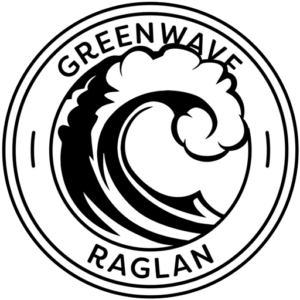 and I just put my finger on a map and settled in Raglan, down south of Auckland, and we just had the beach there in Raglan, and ran into these really nice fellas who had a surf school called Green Wave. And, got to talking, and we ended up offering them tickets to our show in trade for surfing lessons. So Adrianne [Lenker] and I surfed every morning for a couple weeks with those boys. And they were, just so incredibly gracious to us, such good teachers, that anybody who has a chance to get down there to Raglan and surf, being with those homies, they’re good people.
and I just put my finger on a map and settled in Raglan, down south of Auckland, and we just had the beach there in Raglan, and ran into these really nice fellas who had a surf school called Green Wave. And, got to talking, and we ended up offering them tickets to our show in trade for surfing lessons. So Adrianne [Lenker] and I surfed every morning for a couple weeks with those boys. And they were, just so incredibly gracious to us, such good teachers, that anybody who has a chance to get down there to Raglan and surf, being with those homies, they’re good people.
MD: Excellent. And have you had any chance to go surfing since then?
BM: Yes. I actually moved to Topanga Canyon, north of Los Angeles, six months ago, and I’ve been surfing as much as I can, almost every day.
MD: Cool.
BM: At Topanga Beach… Sunset Beach, Malibu.
MD: And were you living on the East Coast before that?
BM: Well… I left Texas in 2005, and I’ve been in a new house every… at least once a year, since then. I was in Boston for six years, all over the Boston area, and then New York for… three or four years, before Big Thief started touring. But really, Big Thief’s been on the road for the last five years straight. I haven’t had an apartment, or any kind of central home, pretty abstract. But New York was definitely my kind of hub. In between tours, I would just, kind of sleep with friends, on friends’ couches, that sort of thing, in between tours, for the last few years, in New York.
MD: And so, being on tour for four or five years, like you guys have, what does that do to the band? How does it change you guys, or affect the way – say this album, has now finally come out at the end of it?
BM: Well, I think that it’s taught us – it’s incentivized us to… to really deepen our communication with each other. Uh, travelling like astronauts, essentially, like, it really brings up every little … idiosyncrasy, and… we’re really lucky that we’ve chosen to reconcile with every little thing, we’ve developed a really strong and lucid communication between the four of us, and I think that’s really developed a sense of trust, a really deep sense of trust, which, translates into the music. The music is really just a result of our friendship, and our… our love for each other. Like, the 23 hours of the day that we’re not making music, you know. Um, but touring, I think, has been kind of like a pressure cooker there, and at this point, it almost feels like a telepathic friendship…hive-mind.
MD: Uh-huh. So I know that when you guys did play here, one of the songs you performed was Terminal Paradise, which was at the time unreleased, and now it’s on the new album. And I think, when Adrianne introduced it, she said something along the lines of – you know, you guys were heading in a new direction, and she mentioned something like low dynamics… as being the overarching direction you were going in. Is that how you would describe it? How would you say you’ve musically travelled since the previous record?
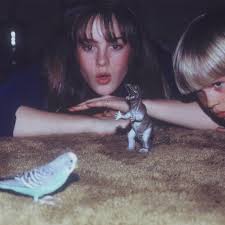 BM: Well, I think the biggest evolution has just been the breadth of our… of our connection. You know, when we made Masterpiece, we had really just begun rehearsing. We’d gone on a couple – maybe, a one-week long tour, and we’d made Masterpiece really quickly, with a different drummer named Jason Burger, who’s incredible, and then we made Capacity, having never even played a show with James Krivchenia before, and we made that record really fast in the studio and arranged all the songs. And this record, we made after travelling with James and Max [Oleartchik] after travelling for three years straight, having played hundreds of shows and so. It just feels like we have a natural… flow, rhythmically, and a breadth to our relationship, you know? Like that kind of kaleidoscopic relationship between the four of us just feels really organic, at this point, having played so many shows together. I think that really translates in this record, more than the others.
BM: Well, I think the biggest evolution has just been the breadth of our… of our connection. You know, when we made Masterpiece, we had really just begun rehearsing. We’d gone on a couple – maybe, a one-week long tour, and we’d made Masterpiece really quickly, with a different drummer named Jason Burger, who’s incredible, and then we made Capacity, having never even played a show with James Krivchenia before, and we made that record really fast in the studio and arranged all the songs. And this record, we made after travelling with James and Max [Oleartchik] after travelling for three years straight, having played hundreds of shows and so. It just feels like we have a natural… flow, rhythmically, and a breadth to our relationship, you know? Like that kind of kaleidoscopic relationship between the four of us just feels really organic, at this point, having played so many shows together. I think that really translates in this record, more than the others.
MD: And also, you guys – so you travelled to rural Washington State? Is that where you recorded the record?
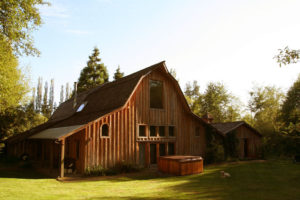 BM: Yeah, we recorded this one at a studio called Bear Creek, in Woodinville, Washington, just north of Seattle. A really beautiful studio built out of this old barn, and old ghost redwood trees, and fern gullies.
BM: Yeah, we recorded this one at a studio called Bear Creek, in Woodinville, Washington, just north of Seattle. A really beautiful studio built out of this old barn, and old ghost redwood trees, and fern gullies.
MD: And so, even though you spent so much time together on the road, you kind of ensconced yourself together in the middle of nowhere, in Washington. Was that on purpose?
BM: Um, yes. We – we definitely put the intention to record, in isolated environments with no distractions, but a deep connection to nature. I feel like – we’re a very intense band. We all have our own strong personalities, and I think that – the idea of recording in a city, in the – like, within, in the womb of this more chaotic environment, I think that would feel a little claustrophobic for us, because whenever we’re actually in the studio recording, it can be very high intensity. And super productive, too.
But to be out in the woods, and to be able to step outside, and go for a nature walk, or just sit with the birds, and breathe fresh air, I think helps us really… you know, balance that intensity. And… and, it gives us a space to spend time with each other, outside of the studio, that doesn’t feel like – as chaotic as the city, everyone going back to their apartments, or… jumping on the bus or the train, and disappearing, like… I think it’s really important for us to keep that thread of… unification together, while recording, but it needs balance, outside of the studio space.
MD: And, the process of… the song coming to you guys. I assume Adrianne writes most of the material and brings it to you? How does it turn into what we end up hearing, at that point?
BM: Adrianne generally brings the bones of a song. Like, she’ll bring the lyrics and the melody in, with a guitar part, you know. And then we’ll arrange it from scratch together. And sometimes we’ll change the arrangement, you know, we’ll change the form around here and there, and from time to time, we’ll contribute lyrically as a group, and sometimes she’ll bring in a half-finished song that may just have a melody, and… she’ll kind of ask us to pitch in lyrical ideas. But for the most part, she’ll bring in the bones of a song with the lyrics already formed, and we’ll put the music together, together.
MD: Uh-huh. So I was hoping to touch on a couple of tracks on the record, uh, the first one being the opening track, which is called Contact. Which starts out, very kind of dreamy…and pastoral, and at the end it sounded to me like there was this terrifying screaming going on? So, uh, maybe if you can explain what’s happening there.
BM: Oh, that’s just Adrianne screaming her head off. She’s been trying to squeeze that scream in for years now. I found the Masterpiece session, we had just recorded Real Love, and… late into the evening, Adrianne spent about an hour screaming at top of her lungs on the back of Real Love, and I think the neighbour came a-knockin’, and was threatening to call the cops. The neighbours assumed there was some kind of violent murder happening in the house we were recording in, because we were just recorded Masterpiece in an old little cabin on Lake Champlain. Never made it on that record, but she kind of played on it on this one.
MD: Managed to sneak it in there, huh? And your guitar playing. It seems to have, for want of a better word, since I’m not a musician, kind of a circular style on this record? Where you kind of… how did you approach turning these songs into what they are with your guitar?
 BM: Oh, yeah. Well. I’ve always been inspired by… yeah, more circular forms. For instance, I studied the mbira, which is this West African thumb-piano, mostly from Zimbabwe, I believe – I studied the mbira for a minute, I’m just a hobbyist, but nonetheless, the thing that really struck me about the mbira music, it’s essentially a 12-bar form, if we were to analyse it with our Western mind, but you’ll have, you know – four or five or six mbiras, four or five or six players, all performing their own part. For instance, the first player will start this melody – just, it’s 12 bars long in our minds, and then the second player will come in, maybe like, 10 seconds in, at the second sixteenth note of the third bar of the first player’s part, and he’ll start a 12-bar phrase… and then the third player will come in like, half-way through the sixth bar of that first player’s phrase, and eventually it’s just this layer of 12-bar circular forms, but to the point where there’s no – because they’re all layered and they’re all starting in their own way… there’s no one anymore. There’s no… foundation of like starting point and ending point, there’s just this circular web, of like, a web of circles, almost. And that just fascinates me. It’s almost as if someone turned on a radio station In the middle of a song, something like that. And so I try to think that way. I try to at least allude to that particular … on the guitar…
BM: Oh, yeah. Well. I’ve always been inspired by… yeah, more circular forms. For instance, I studied the mbira, which is this West African thumb-piano, mostly from Zimbabwe, I believe – I studied the mbira for a minute, I’m just a hobbyist, but nonetheless, the thing that really struck me about the mbira music, it’s essentially a 12-bar form, if we were to analyse it with our Western mind, but you’ll have, you know – four or five or six mbiras, four or five or six players, all performing their own part. For instance, the first player will start this melody – just, it’s 12 bars long in our minds, and then the second player will come in, maybe like, 10 seconds in, at the second sixteenth note of the third bar of the first player’s part, and he’ll start a 12-bar phrase… and then the third player will come in like, half-way through the sixth bar of that first player’s phrase, and eventually it’s just this layer of 12-bar circular forms, but to the point where there’s no – because they’re all layered and they’re all starting in their own way… there’s no one anymore. There’s no… foundation of like starting point and ending point, there’s just this circular web, of like, a web of circles, almost. And that just fascinates me. It’s almost as if someone turned on a radio station In the middle of a song, something like that. And so I try to think that way. I try to at least allude to that particular … on the guitar…
MD: Do you listen to a lot of, for better word, world music in your spare time? What kind of stuff do you expose yourself to?
BM: I listen to a lot of Romanian music, Romanian manouche, waltzes, and manouche jazz, like Django Reinhardt, and French Romanis, and… true, I love so much African music, I love Ethiopian music, and um… music from the Caribbean. I love the first wave stuff, as in Desmond Dekker, with Israelites … and all those. And Brazilian music…
MD: – And how did you get exposed to Romanian music?
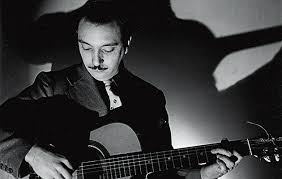 BM: When I was in high school – I went to this charter high school in Texas, called Katherine Anne Porter. This beautiful little charter high school in the hillcountry, and they brought in this guitar teacher named Django Porter, who was the son of a great pedal steel player, who played with Merle Haggard and all those dudes. His father named him Django after Django Reinhardt, and then serendipitously, he fell into that tradition musically, and became this incredible manouche jazz guitar player, and took me under his wing, when I was maybe 15 years old, and gave me the opportunity to back him up on rhythm guitar, playing that Romani manouche music, through all of Texas.
BM: When I was in high school – I went to this charter high school in Texas, called Katherine Anne Porter. This beautiful little charter high school in the hillcountry, and they brought in this guitar teacher named Django Porter, who was the son of a great pedal steel player, who played with Merle Haggard and all those dudes. His father named him Django after Django Reinhardt, and then serendipitously, he fell into that tradition musically, and became this incredible manouche jazz guitar player, and took me under his wing, when I was maybe 15 years old, and gave me the opportunity to back him up on rhythm guitar, playing that Romani manouche music, through all of Texas.
MD: From Texas… that’s pretty wild. Um, speaking of jazz, there seems to be a jazzy vibe to the track Century, it’s a very intimate song. Can you tell us a little bit about uh, making that one?
BM: Yeah. Um, that’s a unique song, I think, for Adrianne. It’s so… romantic. And it’s so… subtle. And we really wanted to honour the song by… putting the least amount of parts on top of it. I had actually recorded an acoustic guitar part over the whole song, kind of strumming along with her, that we removed, because it just felt like – it made sense that it didn’t really matter that it wasn’t just really serving the… the, essence of the song, and then I think I recorded an electric guitar part, um, over the whole song as well, a more melodic piece, that we ended up deleting almost all of, except for the very end. My electric guitar kind of blooms up at the end. Yeah, the process for that was just trying to really keep it simple, and honour the narrative.
MD: Uh huh. And on Terminal Paradise, there seems to be more production involved – like, overlapping vocals, and almost a montage that builds up at the end of that. How much of your producer is involved in that – what’s his name, Andrew Sario, is it?
BM: Andrew Sarlo.
MD: Sarlo, sorry.
BM: Sarlo’s a bit – mm, you mean, how much is he involved?
MD: Yes.
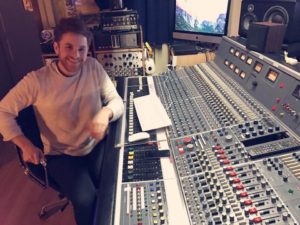 BM: When we’re in the studio, I consider Sarlo the fifth member of our band. Of course, he doesn’t tour with us. But I think our band – any band is a fluid thing, you know. I think, we see bands, we define them, as fans, as listeners, as these static… identities, or these static groups? But really, they change every day. And for instance, when Big Thief’s on stage with the four of us, and we’re in the studio with Andrew Sarlo, and even Dom Monks, our engineer, it’s really a six-piece band, and we’ve recorded every record with Andrew Sarlo, all the way back to Adrianne in college. I think, made her first record which was never released with Andrew Sarlo, and…. Whenever Adrianne and I were playing as a duo, Andrew produced our first EP, A-Sides and B-Sides, and then Capacity and Masterpiece … um, so I think we have the same amount of trust, with him, as we do with each other in the band, and we all contribute pretty equally, I think, as far as the arrangements and the sonic… approach.
BM: When we’re in the studio, I consider Sarlo the fifth member of our band. Of course, he doesn’t tour with us. But I think our band – any band is a fluid thing, you know. I think, we see bands, we define them, as fans, as listeners, as these static… identities, or these static groups? But really, they change every day. And for instance, when Big Thief’s on stage with the four of us, and we’re in the studio with Andrew Sarlo, and even Dom Monks, our engineer, it’s really a six-piece band, and we’ve recorded every record with Andrew Sarlo, all the way back to Adrianne in college. I think, made her first record which was never released with Andrew Sarlo, and…. Whenever Adrianne and I were playing as a duo, Andrew produced our first EP, A-Sides and B-Sides, and then Capacity and Masterpiece … um, so I think we have the same amount of trust, with him, as we do with each other in the band, and we all contribute pretty equally, I think, as far as the arrangements and the sonic… approach.
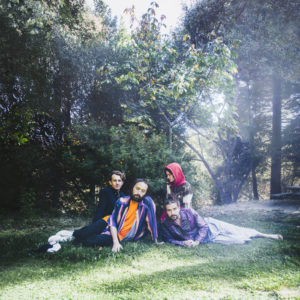 MD: And finally, just to wrap things up, do you have a kinda favourite moment or track on the album, something that stands out for you personally?
MD: And finally, just to wrap things up, do you have a kinda favourite moment or track on the album, something that stands out for you personally?
BM: One of my favourite moments is, er, the background choir on the song From. Adrianne’s sister, Zoë… Lenker, was in the studio with us for I think a week or two, even, and she was cooking these incredible meals for us. We were so busy, we needed someone to help with the food and… Zoë is just one of the most incredible cooks I’ve ever… I’ve ever seen, and she was making these beautiful meals, and then half-way through that song, we just like… pulled her in from the kitchen, and we all stood in the big barn room, and we all sang the background choir parts together with Zoë. And her voice is very similar to Adrianne’s, but a little deeper, like – a little more – a little bassier and fuller, but to hear their two voices blending has always been really special to me. And to hear the whole band together, with Max and James and me, and Zoë, all in the room, I think, that’s one of my favourite moments on the record and definitely the highlight of the actual recording process for me.
Big Thief’s U.F.O.F. is released this Friday